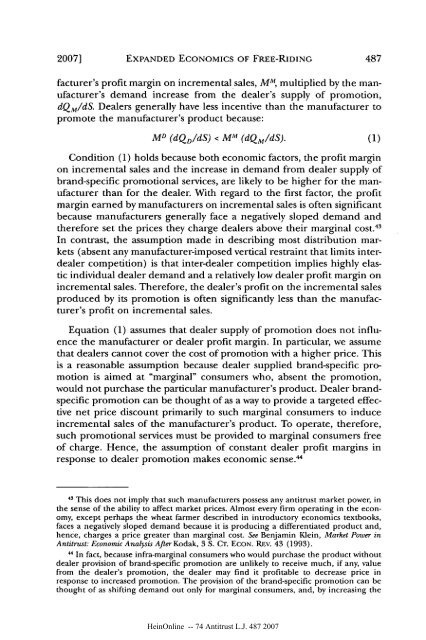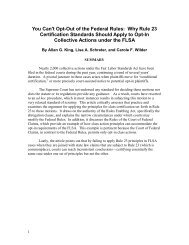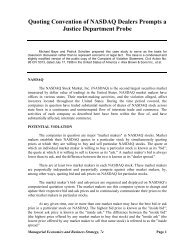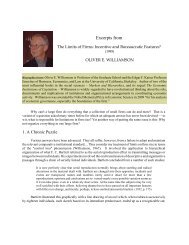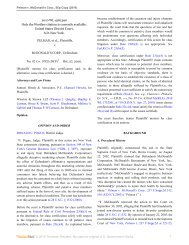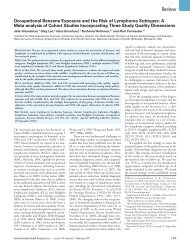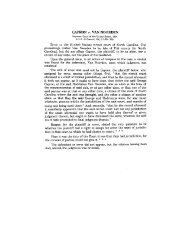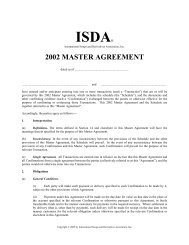Klein and Lerner, âThe Expanded Economics of Free-Riding: How ...
Klein and Lerner, âThe Expanded Economics of Free-Riding: How ...
Klein and Lerner, âThe Expanded Economics of Free-Riding: How ...
Create successful ePaper yourself
Turn your PDF publications into a flip-book with our unique Google optimized e-Paper software.
2007]EXPANDED ECONOMICS OF FREE-RIDINGfacturer's pr<strong>of</strong>it margin on incremental sales, M m, multiplied by the manufacturer'sdem<strong>and</strong> increase from the dealer's supply <strong>of</strong> promotion,dQM/dS. Dealers generally have less incentive than the manufacturer topromote the manufacturer's product because:M' (dQD/dS) < M M (dQM/dS). (1)Condition (1) holds because both economic factors, the pr<strong>of</strong>it marginon incremental sales <strong>and</strong> the increase in dem<strong>and</strong> from dealer supply <strong>of</strong>br<strong>and</strong>-specific promotional services, are likely to be higher for the manufacturerthan for the dealer. With regard to the first factor, the pr<strong>of</strong>itmargin earned by manufacturers on incremental sales is <strong>of</strong>ten significantbecause manufacturers generally face a negatively sloped dem<strong>and</strong> <strong>and</strong>therefore set the prices they charge dealers above their marginal cost. 43In contrast, the assumption made in describing most distribution markets(absent any manufacturer-imposed vertical restraint that limits interdealercompetition) is that inter-dealer competition implies highly elasticindividual dealer dem<strong>and</strong> <strong>and</strong> a relatively low dealer pr<strong>of</strong>it margin onincremental sales. Therefore, the dealer's pr<strong>of</strong>it on the incremental salesproduced by its promotion is <strong>of</strong>ten significantly less than the manufacturer'spr<strong>of</strong>it on incremental sales.Equation (1) assumes that dealer supply <strong>of</strong> promotion does not influencethe manufacturer or dealer pr<strong>of</strong>it margin. In particular, we assumethat dealers cannot cover the cost <strong>of</strong> promotion with a higher price. Thisis a reasonable assumption because dealer supplied br<strong>and</strong>-specific promotionis aimed at "marginal" consumers who, absent the promotion,would not purchase the particular manufacturer's product. Dealer br<strong>and</strong>specificpromotion can be thought <strong>of</strong> as a way to provide a targeted effectivenet price discount primarily to such marginal consumers to induceincremental sales <strong>of</strong> the manufacturer's product. To operate, therefore,such promotional services must be provided to marginal consumers free<strong>of</strong> charge. Hence, the assumption <strong>of</strong> constant dealer pr<strong>of</strong>it margins inresponse to dealer promotion makes economic sense. 4411 This does not imply that such manufacturers possess any antitrust market power, inthe sense <strong>of</strong> the ability to affect market prices. Almost every firm operating in the economy,except perhaps the wheat farmer described in introductory economics textbooks,faces a negatively sloped dem<strong>and</strong> because it is producing a differentiated product <strong>and</strong>,hence, charges a price greater than marginal cost. See Benjamin <strong>Klein</strong>, Market Power inAntitrust: Economic Analysis After Kodak, 3 S. CT. ECON. REv. 43 (1993).44 In fact, because infra-marginal consumers who would purchase the product withoutdealer provision <strong>of</strong> br<strong>and</strong>-specific promotion are unlikely to receive much, if any, valuefrom the dealer's promotion, the dealer may find it pr<strong>of</strong>itable to decrease price inresponse to increased promotion. The provision <strong>of</strong> the br<strong>and</strong>-specific promotion can bethought <strong>of</strong> as shifting dem<strong>and</strong> out only for marginal consumers, <strong>and</strong>, by increasing theHeinOnline -- 74 Antitrust L.J. 487 2007


